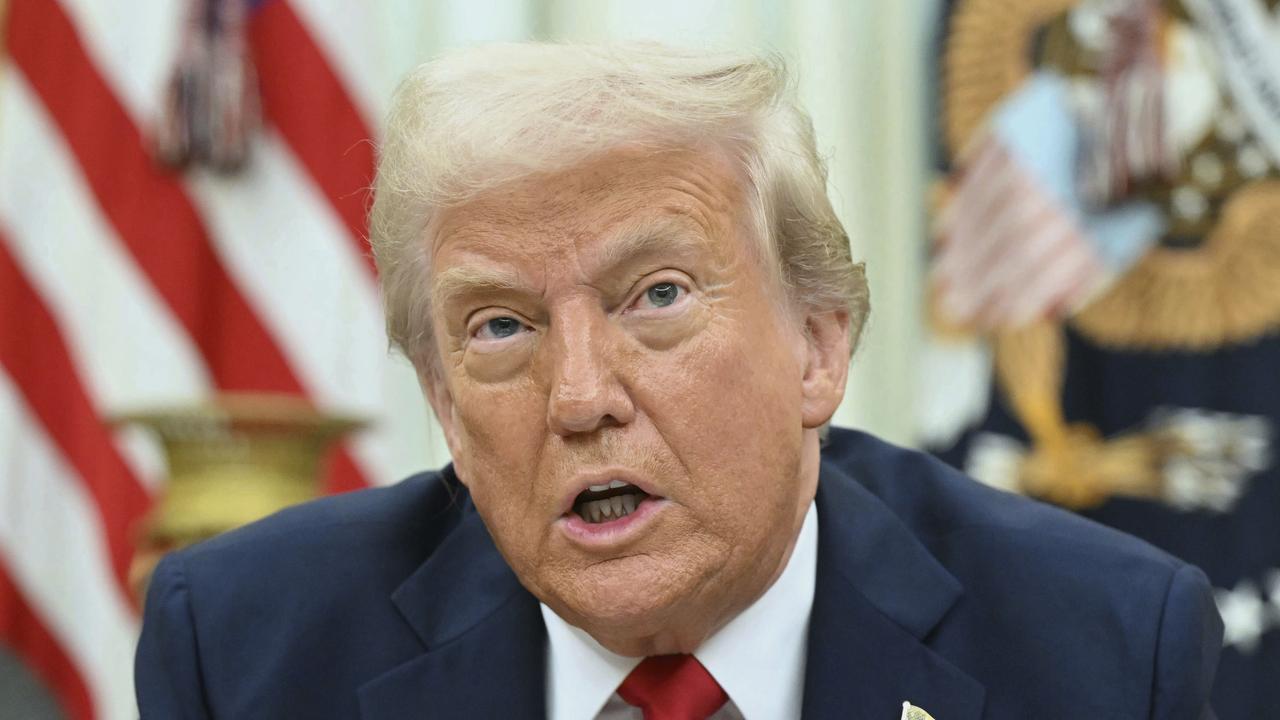Donald Trump always up for ‘good negotiation’ as Liberation Day tariffs looms
The White House has confirmed Donald Trump’s ‘Liberation Day’ tariffs will take effect as soon as they are unveiled. See how world markets are reacting ahead of the announcement.
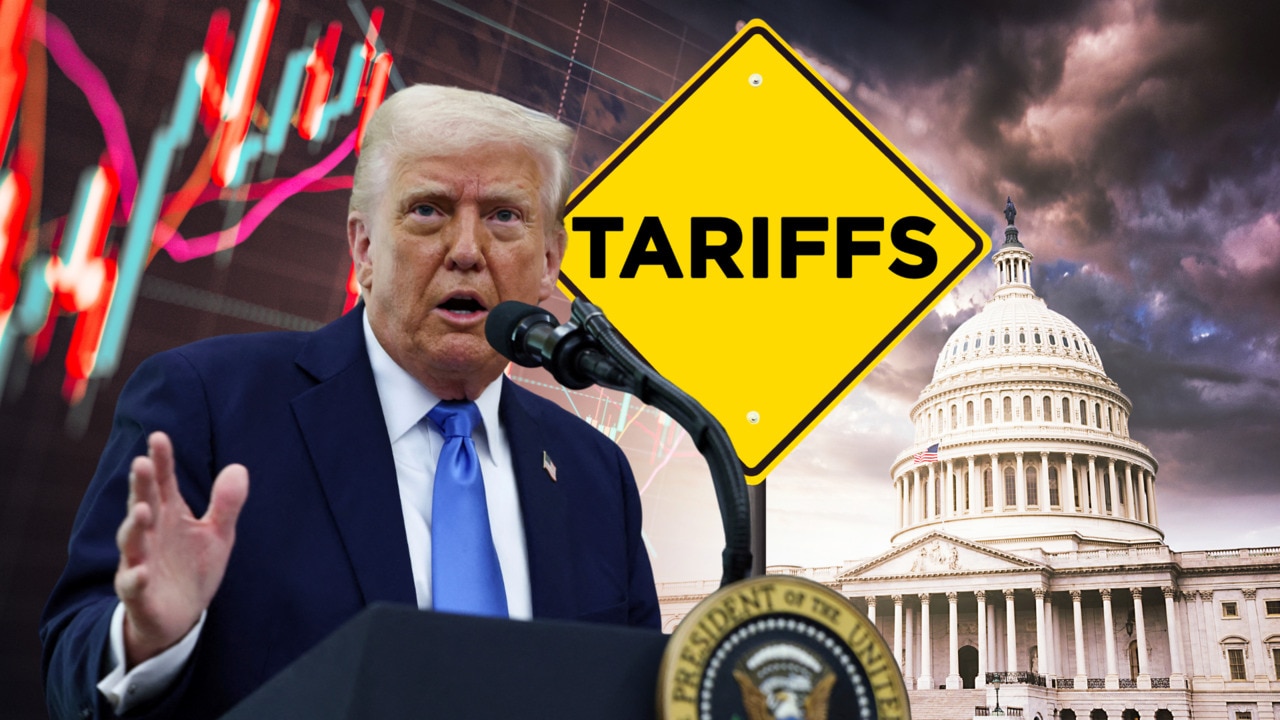
World
Don't miss out on the headlines from World. Followed categories will be added to My News.
Donald Trump has the world’s leading economies on edge as the US president prepared to unveil a promised raft of tariffs that could trigger a cascading global trade war.
Mr Trump kept rivals and allies alike guessing about who would be targeted and by how much, but promised to be “very kind” when addressing what he has dubbed “Liberation Day” on Wednesday.
Global stocks remained volatile ahead of the so-called “reciprocal tariffs,” which Mr Trump says are necessary to combat unfair trade imbalances with countries that target the United States.
The Republican billionaire, a fan of tariffs for decades, said on Monday night that he had “settled” on a plan but kept the world in suspense as he refused to reveal the details.
Mr Trump would only say that the tariffs would be lower than what other countries would be charging the United States, adding that “we sort of have a world obligation perhaps.”
“We’re going to be very nice, relatively speaking, we’re going to be very kind,” he said in the Oval Office.
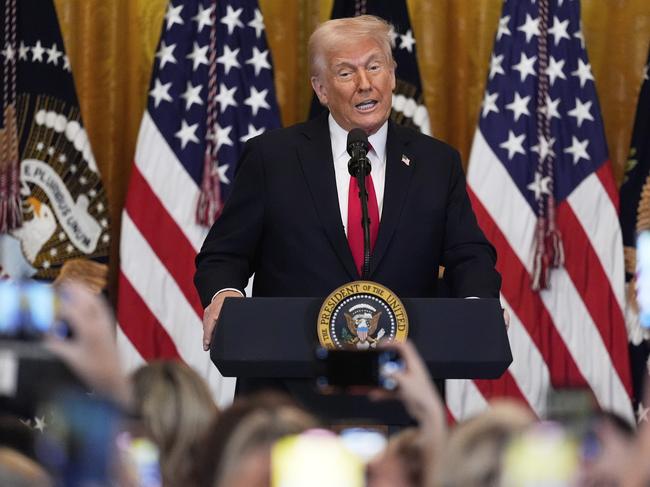
Mr Trump is set to hold a “Make America Wealthy Again” press conference in the Rose Garden at the White House at 4pm Wednesday (7am Thursday AEDT).
Briefing journalists on Tuesday, local time, White House press secretary Karoline Leavitt confirmed the tariffs would take effect immediately after they were unveiled.
“Liberation Day in America would be taking place today, if not for April Fool’s Day, but tomorrow will be the day, and he [Mr Trump] has been talking about it for a while,” she said.
“He is with his trade and tariff team right now, perfecting it to make sure this is a perfect deal for the American people and the American worker, and you will all find out in about 24 hours from now.”
Asked whether there was anything global leaders could do to avoid sweeping new tariffs, Ms Leavitt said that Mr Trump was “always up” for a phone call or “good negotiation”.
“But he is very much focused on fixing the wrongs of the past and showing that American workers have a fair shake,” she added.
Ms Leavitt also said there had been “quite a few countries that have called the president and have called his team, in discussion about these tariffs”.
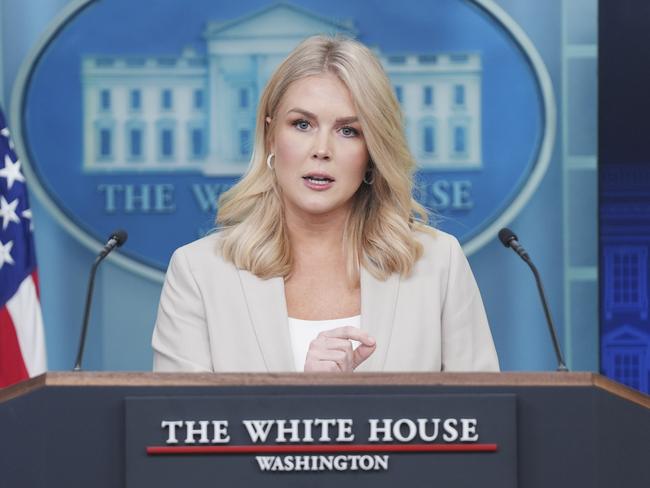
Critics warn that the strategy risks a global trade war, provoking a chain reaction of retaliation by major trading partners like China, Canada and the European Union
European Commission President Ursula von der Leyen said the EU had a plan to counteract looming tariffs.
“Europe has not started this confrontation,” she said on Tuesday in Strasbourg, France.
“We do not necessarily want to retaliate, but we have a strong plan to retaliate if necessary.”
She also warned that more tariffs would only fuel inflation, which is “exactly the opposite of what we want to achieve.”
America’s neighbours Canada and Mexico were already gearing up but suffered amid the uncertainty.
“No one knows what’s going to happen,” Carrie McEachran, head of the Sarnia Lambton Chamber of Commerce on the US-Canada border, told AFP.
“It’s tough to put together a concrete plan.”
Mr Trump’s advisers have pitched imposing a 20 per cent global tariff to hit almost all US trading partners, the Wall Street Journal reported, while the White House suggested Monday they might be “country specific.”
The US president, who began his second term in office in January, claimed the tariffs will drive the “rebirth” of America as a manufacturing giant and stop it being “ripped off.”
But his plans have caused huge uncertainty, jolting markets around the world and stoking fears of recession at home in America and abroad.
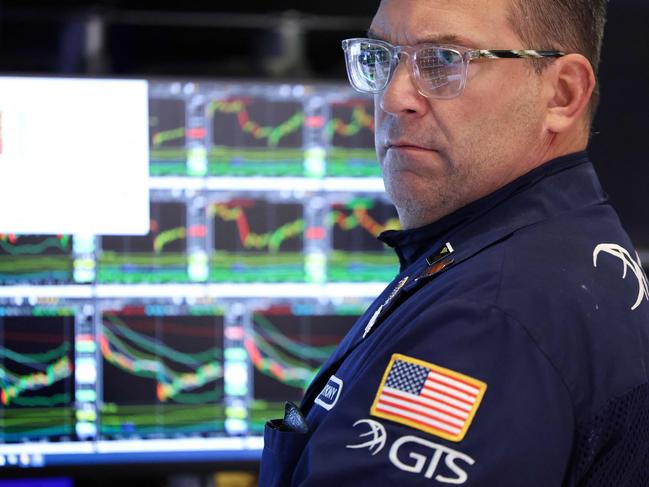
WALL STREET DIPS
Wall Street dipped on Tuesday but European and Asian stock markets rose as investors waited nervously for the announcement. Safe-haven gold touched a fresh record high.
US stocks on the S&P 500 and Nasdaq indexes have now had what is their worst quarter since 2022.
Shortly after markets opened, the Dow Jones Industrial Average was down 0.5 per cent at 41,785.60.
The broadbased S&P 500 Index fell 0.4 per cent to trade at 5,588.74, and the tech-focused Nasdaq Composite Index slipped 0.4 per cent to 17,222.90.
The slide on Wall Street comes a day after the S&P 500 and the Nasdaq recorded their worst quarter since 2022.
“The market’s going to wait on the sidelines, remain defensive and remain under pressure,” B. Riley Wealth Management’s Art Hogan told AFP.
“I don’t think the market’s going to change its approach unless and until it gets to a place where the fog of this trade war clears up,” he added.
Among individual companies, US airlines Delta and United were down 4.5 and 3.9 per cent respectively amid concerns that tourists are cutting back on trips to the United States.
US MANUFACTURING SHRINKS AS TARIFFS LOOM
Ahead of the announcement, US manufacturing activity contracted, snapping a two-month expansion as firms contended with uncertainty over tariffs, according to survey data published on Tuesday.
Traders are nervously preparing for sweeping reciprocal tariffs on April 2, which US President Donald Trump has dubbed “liberation day,” without providing much detail on the levies that are set to be imposed.
The Institute for Supply Management (ISM) manufacturing index slipped to 49.0 per cent last month, a 1.3 percentage point fall from February.
This was below the market consensus estimate of 49.8 per cent, according to Briefing.com, and less than the 50-point mark separating expansion from contraction.
“U.S. manufacturing activity slipped into contraction after expanding only marginally in February,” ISM survey chief Timothy Fiore said in a statement. “The expansion in both February and January followed 26 consecutive months of contraction.”
“Demand and production retreated and destaffing continued, as panellists’ companies responded to demand confusion,” he added, noting that price growth had accelerated “due to tariffs.” Tariffs had also caused a backlog in new order placement, supplier delivery slowdowns and manufacturing inventory growth, he said.
FORD US AUTO SALES DIP AS TARIFFS LOOM
Auto giant Ford reported a slight drop in first quarter US sales on Tuesday, while investors await details of President Donald Trump’s upcoming tariffs this week and assess the effects of duties on major carmakers.

The automaker reported a 1.3 per cent dip in sales in the world’s biggest economy, to 501,291 vehicles, compared with the same period in 2024.
This was mainly due to the discontinuation of certain vehicle models and rental fleet sales timing, the company said.
Economists warn that Mr Trump’s sweeping tariffs on autos and parts, over time, could cause average auto prices to surge by thousands of dollars.
JPMorgan analysts have estimated that over 80 per cent of Ford’s US sales are produced domestically.
Auto tariffs of 25 per cent are set to kick in Thursday.
The American Automotive Policy Council representing the big three automakers have warned that tariffs should be implemented in a way that avoids lifting costs for consumers and preserves the industry’s competitiveness.
Mr Trump is due to announce additional reciprocal levies midweek to address trade practices his administration deems unfair.
FACING US TARIFFS, CANADA WARMS TO EUROPE
With his small steel mill facing hefty US tariffs, Canadian businessman Chris Wyatt is hunting for new European customers at the world’s biggest industrial technology fair in Germany.
“There’s uncertainty in the markets so big projects are being shelved or they’re just not moving ahead,” said sales director Wyatt, handing out flyers at his stand, alongside big players in robotics and factory machinery.
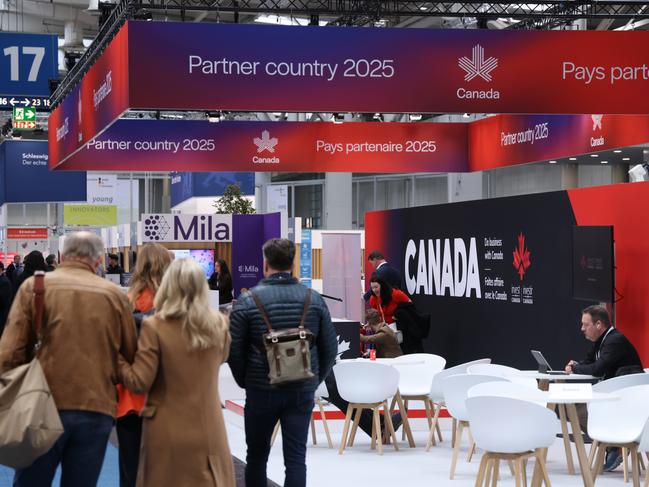
This week’s Hanover Fair, which has attracted more than 4,000 exhibitors from around 60 countries, takes place as US President Donald Trump gears up to announce a wave of “reciprocal tariffs”, ratcheting up global trade tensions even further.
And this year’s guest of honour is Canada – a clear signal that Europe stands with Ottawa as it faces not just hefty duties from the United States, its largest trading partner, but also Mr Trump’s threats to annex the country.
“Welcome to Germany, dear Canadian friends,” German Chancellor Olaf Scholz said.
“We stand by your side.”
Wyatt’s Ontario company Kubes Steel currently exports 80 per cent of its production, specialised steel for a range of industries including the nuclear sector, to the United States.
“Of course, we are concerned,” said Wyatt, whose company employs about 80 people.
US duties on imports from the auto sector are bad news for Milko Konzelmann, whose German family-run business producing plastic car parts and valves makes around a quarter of its sales in the world’s biggest economy.
“I will lose money,” he said, adding that his company will focus more on Asia. Shifting production to the United States to avoid tariffs would “take years” and is a “big decision for a medium-sized company” with just 300 employees, he said.
Despite the hostility towards President Trump in Europe, American companies, including Dell, IBM, Microsoft and Nvidia, were out in force in Hanover, with some not shy about speaking in favour of the president’s drive to rebalance US trade with the EU.
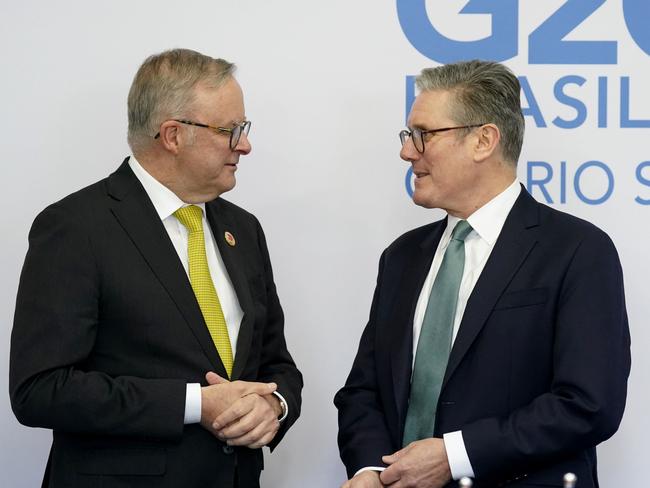
UK ‘LIKELY TO SUFFER TARIFFS’: PM
Britain is likely to suffer US tariffs despite making “rapid progress” over a trade deal with Washington, Prime Minister Keir Starmer said Tuesday.
He spoke as US trading partners braced for an expected fresh raft of tariffs from President Donald Trump, in addition to levies already imposed on steel and those set to take effect this week on cars.
“We’re working hard on an economic deal, which we’ve made rapid progress on … but look, the likelihood is there will be tariffs,” Starmer told Sky News.
Britain has set out to strike a trade deal with the United States since departing the European Union at the start of the decade.
It is thought that the UK government wants to agree to some kind of economic deal before Wednesday when Mr Trump is set to unveil “reciprocal” tariffs, tailored to different trading partners.
Downing Street has described a potential agreement as an “economic prosperity deal”, indicating it will fall short of a free trade deal ultimately sought by London.
As it stands, the United States is the UK’s single largest country trading partner.
Business Secretary Jonathan Reynolds voiced confidence that the UK and US would come to some kind of arrangement over tariffs.
“If the US can reach an agreement with anyone, I believe it can with the UK,” he told Times Radio, citing work between the two nations during trade negotiations over recent weeks.




